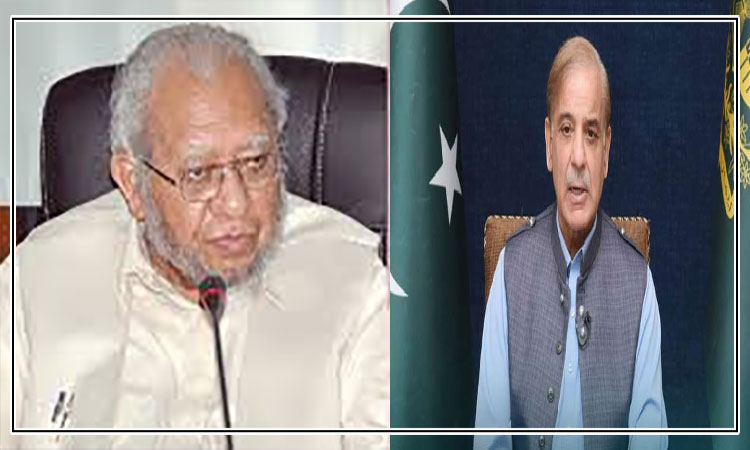Sir Henry’s century… Farrukh Khan Pitafi
T oday, on the 27th of May, Henry Kissinger turns 100. Two days ago, his son, David Kissinger, wrote a piece in The Washington Post titled My father, Henry Kissinger, is turning 100. This is his guide to longevity. I read it more than once to divine the secret of his longevity. I could not. I could only find a doting sons braggy homage to his father.
There is advice for you if you want to live on a diet heavy on bratwurst and Wiener schnitzel and a love of sports purely as a spectator, never a participant. Add to it an unhealthy dose of stressful decisionmaking. But to this mortal whose cardiologist insists he should lay off the red meat if he wants to live long enough, such a diet and sedentary, if stressful lifestyle seems plucked out of a work of pulp fiction. Well, stress is one thing we cannot avoid, but the rest is just tempting fate.
At any rate, I am pretty sure Dr Kissinger has a portrait of him painted by Basil Hallward hidden somewhere in his basement. But ordinary folks like us who cannot afford this luxury ought not to heed this advice. I fell in love with Dr Kissingers pen precisely a quarter of a century ago when as a university student, I came across his book, Diplomacy. If you have ever read a more nuanced and better written book on the history and the subtle art of diplomacy, pray do share with me, for I have not. And I have often been accused of being a voracious and indiscriminate reader.
Please do not tell me that books by Churchill and Gibbon are better because while they are better written, they are neither as crisp nor as broad in scope. But I wasnt the only one who had found the work compelling. One fellow student had copied this voluminous book in his handwriting. I still dont understand what he got out of it. But the point was to highlight peoples reverence for the book. Little did I know then that I would be reading the best book out of his pen. The works after it, like On China and World Order, pale in comparison. In fact, reading his recent book on artificial intelligence, I felt that I had found definitive proof of his extraordinary intellects decline.
His books before Diplomacy, while being interesting, are not simply as good. His latest book is on leadership, which caused me to write this piece. I will share the reasons in a bit. It was in Oriana Fallacis Interview with History that I spotted something strange about her encounters with him. Reading some thirty years ago, I could not find a word to describe it. I ended up calling it weird. Decades later, I would learn that both were sex symbols of their times. Fallaci, I could understand, Kissinger I could not because though he must be a charming, handsome man in his youth when he gained political influence and was interviewed by her, I would have thought he had the sex appeal of a turnip. I bring this up because I really wanted to know. You see, if nerds like us could crack that code, it would be one giant leap for geek-kind.
But either for the intellect to be seductive, it has to be garnished with smatterings of political power, or then that allure only worked on the opposite sex in the olden times when Dr Kissinger was half his current age. Surely it cant be money because Elon Musk would have bought some love and personality by now. And lets face it. Money is even harder to get for you and me. In any case, you should read that interview because Fallaci forces him to compare himself to a cowboy alone with his horse. The horse, pardon me, Nixon, we are told, did not like that analogy. Fallacis decline became abundantly clear in her Islamophobia, with which she died. Dr Kissingers decline has the longevity of its own. Nixon snidely called Kissinger Sir Henry. Sir Henry makes a century today. Perhaps, like Bernard Lewis brilliant biography Notes on a Century: Reflections of a Middle East Historian, he may eventually write the story of these hundred years.
But I will not be reading his new book on leadership. Let me explain the reasons below. As I said earlier, his book on artificial intelligence and, to a lesser extent, the one on world order were disappointments. Everything eventually declines. Many of us are not half his age yet but are already battling psychosomatic corrosion. But perhaps it is not because of him that these works do not come up to scratch. The world is getting too chaotic. Take the study of artificial intelligence, for instance. There are aspects of AIs evolution and impact that even its creators and experts do not understand. Similarly, to believe that there is a world order which follows a set of at least some rudimentary rules one year before Trump declared his candidacy and changed the world is like believing that if Alexander the Great could conquer most of the known world in 323 BC, anyone could do it now. Those who want to understand this analogy must know that, to an estimate, the world population in Alexanders time was somewhere between 150 and 200 million, and it is 8 billion now. Yet you cannot help but admire the audacity of the mans ambition. My main beef is the central premise of the book. Title: Leadership: Six Studies in World Strategy.
To study examples of leaders to draw broad conclusions is to concede that specific underlying rules govern leadership behaviour. That, in essence it is a science. Sadly that is just glorified fiction. Only one pattern defines the mechanics of leadership. Trial, error and following good advice. But the fallacy doesnt end here. The term social sciences as a construct is highly misleading. We use the word science here as a consolation prize. You did not win anything but came very close. Otherwise, it is impossible to pretend that, like electrons and protons, humans with volition are subject to specific inherent rules.
Too many variables result in too much anarchy. And then there is the problem of Dr Kissinger and my discipline: International Relations, which honestly is a pseudoscience. Why? Because experts in the field do not seem to agree on anything. And they have never predicted anything correctly. To be scientific, a hypothesis has to be falsifiable and its research results replicable. This discipline, therefore, fails the basic test of science. Had Dr Kissinger invested his time writing his comprehensive memoir of a hundred years, I would be the first to buy the book. At any rate, having spent a hundred years living and being able to tell the tale are tremendous accomplishments on their own. Congratulations to him for reaching this milestone.
Courtesy The Express Tribune












